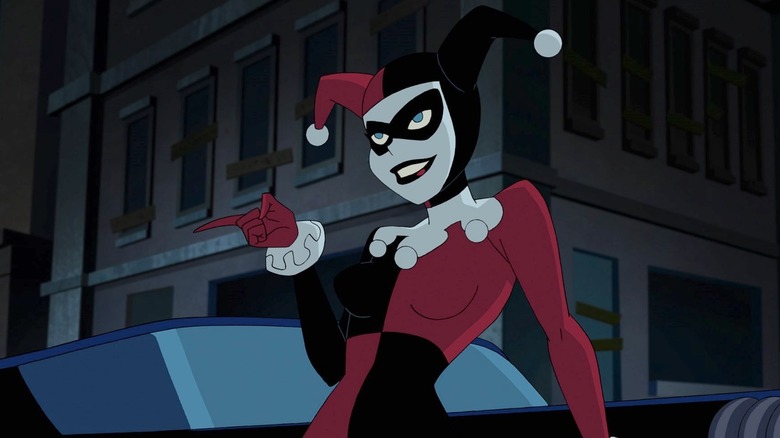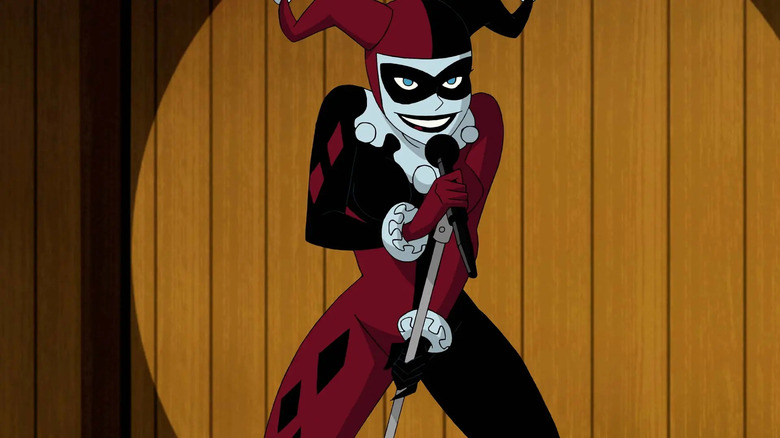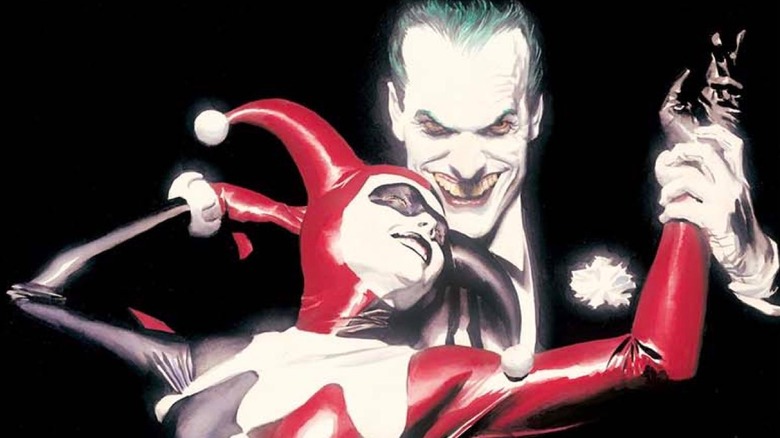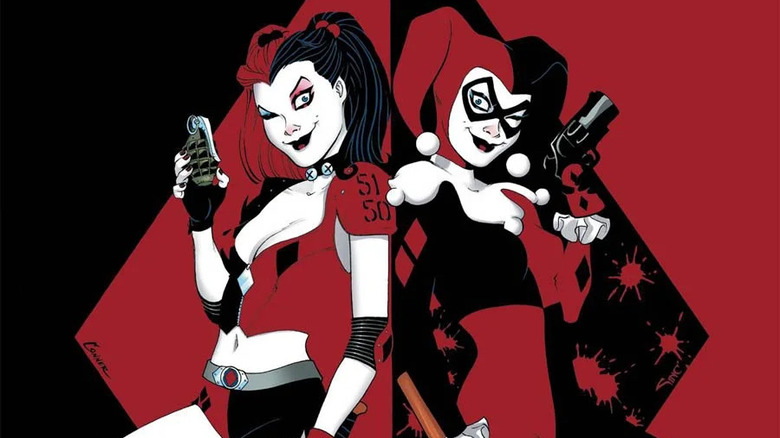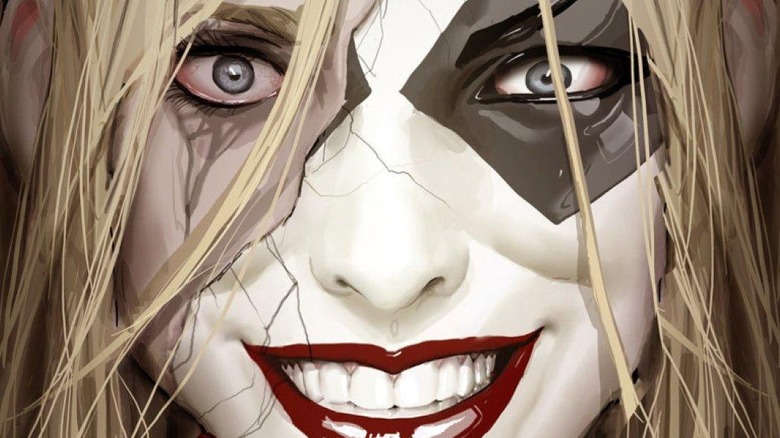The Creators Of Harley Quinn Never Expected Her To Become So Popular
All comic characters evolve with the times, but few have grown from such humble beginnings to become an icon in quite the same way as Harley Quinn. Initially created for "Batman: The Animated Series" simply to add a female henchperson to Joker's minions, Harley has since not only grown increasingly popular, but has also become quite a symbol of hope. She's empowered both the LGBTQ+ community and survivors of domestic violence, as well as countless others who could relate to her resilience, humor, heart, and frankly, how bonkers she can be. Harley has also taken an exciting journey from villain to antihero that is so often reserved for male characters. Her toxic relationship with Joker may have been what once defined her, but when people discuss the character in 2022, Mr. J is barely a footnote. In fact, Harley Quinn has become one of the most compelling of DC's comic characters all on her own.
Since being created by Paul Dini and Bruce Timm for the episode "Joker's Favor" in 1992, Harley Quinn's popularity has obviously skyrocketed. She has headlined her own comic many times over, been portrayed brilliantly by Margot Robbie in three live-action films, and even has her own excellent animated series currently airing on HBO Max. Famed artist and current DC Chief Creative Officer Jim Lee has referred to her as "the fourth pillar" in the comics publishing line, right behind the holy trinity of Superman, Batman, and Wonder Woman. Pretty impressive for a character who was never meant to last more than a single episode on a '90s cartoon. Dini and Timm had no idea Harley would take off in the way that she has. What were their initial plans for the character and how do they feel about her current status?
The fantabulous genesis of one Harley Quinn
Paul Dini and Bruce Timm discussed Harley Quinn's origin with The Hollywood Reporter. Dini explained his process for adding the character to "Joker's Favor." He said:
"As I was putting together the story, I thought, 'What about giving The Joker a girl in the gang this time and referencing the Adam West series?' They had the Riddler, Joker, Penguin with their own henchgirls. I was friends with Arleen Sorkin, and I thought about a character kind of like her persona at the time, which was the snappy, wisecracking blonde. I was home sick and had the TV on, and there she was on 'Days of Our Lives' playing a jester in a fantasy sequence. I saw her running around in a pied piper outfit, and I thought, 'That's kind of cute.'"
After that, Sorkin — a vital part of shaping the character — was the only woman for the job and would go on to voice Harley in many more projects over the years. Others have put their unique stamp on Harley too, though Sorkin's voice is the one most fans will always hear in their heads.
According to Timm, Harley was meant only to be a "one-shot character." He explained to "Total Film," in an issue that will release on August 18, "Her incredible popularity really snuck up on me." The artist didn't realize just how massive Harley's fanbase had grown until he noticed so many more people dressing up as the character at conventions, as well as all the merchandise being sold with her likeness.
Timm also discussed Harley's signature look, noting that he not only took cues from traditional harlequins but also found inspiration in some early comic characters, such as the original Daredevil, who starred in Lev Gleason Publications in the 1940s. He liked the idea of a costume split down the middle with a different color on each side.
More than Joker's girlfriend
Dini told Entertainment Weekly that the initial fan response to Harley Quinn was actually split and talked about how difficult it was to win over comic fans when adding characters who aren't canon. He said that it wasn't until they made her more than a sidekick and deepened her character that people began connecting with Harley. Timm explained to Total Film that there was the concern that the addition of a girlfriend would keep the show from exploring the darker corners of Joker, but that turned out to be entirely untrue. According to Timm, "Every time we brought her back, it was subtle, but we kept adding more shades to her personality."
The duo gave Harley Quinn an origin story in the Eisner Award-winning "Mad Love," which was later adapted into an episode of "Batman: The Animated Series." The tragic tale revealed that Dr. Harleen Francis Quinzel was once the Joker's psychiatrist at Arkham Asylum, at least until he found a way to manipulate her into falling for him. Dini said to EW:
"We came up with the idea of people who are attracted to criminals, especially those who might write to a criminal in jail saying, 'I understand you, I sympathize with what you're going through,' and they just sort of pin all their hopes and dreams on somebody who they think is misunderstood but who is in fact rather dangerous. The fact that Harley might have gone from this intelligent, cool therapist to this crazed clown woman was both very interesting and very tragic to us. We thought that had the makings of a great Batman villain — like Batman himself, his villains start off human but then some tragedy happens and warps them into what they are today."
A symbol of hope
Timm told "Total Film" that despite worries that introducing Harley would serve to soften Joker, it turned out that exploring their relationship brought the show into even bleaker territory. He said, "It was fairly unusual for children's programming, but I think a lot of people — both men and women — saw that story and could relate it, unfortunately."
Harley's story is ultimately one of hope. She did eventually emancipate herself from Joker, though it took substantial time and effort. There is a common misconception about people in abusive relationships, which is that they stay because they are weak. As a survivor myself, I can attest to the fact that people don't stick around due to any sort of deficiency within themselves: it's because their toxic partners convince them they have no other option. It's strange that in this day and age there are some fans who still miss Harley and Joker as a couple. Those two never had a romance worth emulating. Regardless of how Joker actually felt about Harley, all he ever did was control, manipulate, and abuse her. It is indeed dark content for a cartoon, but there is a reason why it resonates with so many people.
Harley even found new love with Poison Ivy in the comics and onscreen. Their romance has become a major focus of HBO Max's "Harley Quinn," whose showrunners say they will never break the two up. Timm told Total Film that he hears stories about Harley's influence quite a bit at conventions. He said:
"They'll either say, 'Seeing Harley and Ivy actually become lovers gave me the courage to come out of the closet,' or they'll say, 'I was in a really bad relationship and I took a page from Harley Quinn and hit the road.' I could never have foreseen that coming, but I think that's why she's become so popular."
Ch-Ch-Changes
Harley Quinn has evolved quite a bit since her creation. Dini told EW that he "felt a great sense of propriety" towards Harley, because he had initially been the only one to write her and it wasn't always easy seeing her grow and change. He also spoke about how the New 52 relaunched the character after she'd been out of the limelight for a while, but also credited writing her into the "Arkham" games with some of her rise in popularity. He discussed how significantly they altered her appearance and praised the character's "adaptability." Discussing the many iterations of Harley he said, "Harley seems to have this innate appeal that people love, and as time progresses Harley will change too, but there will always be something twisted and sweet about her personality." As for Timm, he didn't initially love the changes to Harley's appearance in the "Arkham" games, which makes sense, considering he designed her. He told Total Film:
"I was aware that the design they came up with for her for that game was kinda gnarly. She had the torn fishnets and super huge cleavage and stuff. To me it looked kinda tacky. But now I look back on it and think it was literally one of the big milestones in her career in terms of her popularity. She skyrocketed when that game came out."
Harley has certainly changed with the times both in appearance and attitude. She's been undeniably reshaped in the comics by the awesome duo of Amanda Conner and Jimmy Palmiotti — Stjepan Sejic also gave her an incredible origin with "Harleen" — and just marvel at the difference in her live-action appearances from "Suicide Squad" to "Birds of Prey." Harley Quinn's journey will no doubt continue into all sorts of unexpected places, but I'm sure wherever she goes, we'll all be willing to follow.
